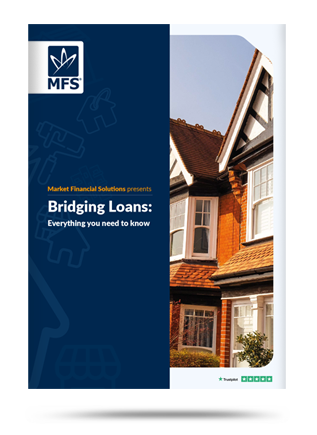Disclaimer
Market Financial Solutions are a bridging loan and buy-to-let mortgage provider, not financial advisors. Therefore, Investors are encouraged to seek professional advice. The information in this content is correct at time of writing.

A private lender bridge loan can be thought of as a specific financial product offered by a private firm, as opposed to a mainstream bank or public body. Private bridge loans are primarily offered by specialist, bespoke lenders such as Market Financial Solutions.
They can come in many forms. There are standard residential or BTL bridging loans that allow investors to purchase properties at speed. Then there are the more niche options, such as auction finance, and developer exit loans.
The reason borrowers are likely to think of specialist lenders when private bridge loans are mentioned is because they’re unlikely to come across these products with high street banks.
Prior to the 2008 credit crunch, many of the big name lenders offered bridging loans. But, as the financial world imploded, mainstream lenders pulled their ‘riskier’ products from the shelves. This left the door open for specialist lenders, who were better positioned to handle risk, to emerge and support property investors.
Some high street banks still have indirect exposure to the bridging market. Institutional bodies can offer funding lines to bridging loan lenders, who in turn deliver those funds directly to borrowers.
The big banks largely haven’t returned to the short term lending market. As a result, borrowers need to have a clear understanding of the differences between the products offered by mainstream lenders, and bespoke lenders.
What are the differences between what banks and bridging lenders offer?
Generally, where property is concerned, banks provide regulated mortgages. Mortgages tend to follow stringent assessment processes, with strict criteria in place.
They’re underwritten based on the borrower’s income, financial position, and ability to repay the mortgage. Where issues emerge in an applicant’s background, it may lead to more costly repayments, or their application could be declined outright.
Whereas private lender bridge loans are unregulated, and can be delivered with flexibility and speed. Bridging finance is underwritten based on the underlying security property, strength of the investment, and feasibility of the exit strategy involved. This means bridging lenders can better accommodate borrowers who may have been turned away on the high street.
Private bridging loans are also solely utilised by property investors. Bridging borrowers will not be able to live in the properties they’re investing in, they will need a regulated mortgage for that.
The term “private bridging loans” could also concern the person doing the borrowing – i.e, a private individual. At Market Financial Solutions, we can accommodate individual borrowers from a range of backgrounds.
They could apply as an individual, as a self-employed worker, via their company, and more. Also, we’re happy to hear from LLPs, SPVs, trusts, and other corporate entities.
Demand for private lender bridge loans
Being clear on these parameters may prove crucial over the coming months. Demand for private lender bridge loans is reaching record heights alongside other types of bridging loans, and may only rise from here.
According to the latest data from the Association of Short Term Lenders (ASTL[1]), bridging loan books hit a record £7.6bn in Q4 2023. Completions also jumped by 18.4% to hit £1.69bn, while applications sat at around £9.6bn. What’s more, a recent survey showed nearly 70% of brokers expect to do more bridging business in 2024.
This expectation isn’t surprising given what we’re seeing in the market. Mortgage arrears in the UK hit a seven-year high in late 2023[2]. Also, consumers seeking the help of Citizens Advice following a CCJ due to energy bill debts doubled last year[3].
Having arrears and CCJs on one’s record can make it difficult to attain finance on the high street. But, these are the exact kinds of issues that private lender bridge loans are designed to accommodate.
Demand is also set to be driven by foreign nationals, and overseas buyers. In 2024, the UK property market is expected to draw around $13bn from American investors alone, according to Knight Frank[4]. Separate analysis from Savills found that investment may also flow into our market from Israel, Japan, and Taiwan.
Again, if these foreign investors try to gain access to our property market via mainstream banks, they may face several hurdles. Overseas investors can raise a number of red flags for banks, who may deem them too risky. But, private bridging loans can be delivered to foreign nationals just as easily as they can be to British investors.
At Market Financial Solutions, we’re ready for this potential rise in demand. With multiple institutional funding lines behind us, we’re able to accommodate brokers from a range of backgrounds, representing all kinds of borrowers.
The Complete Guide to
Bridging Loans
Everything you need to know
- Different bridging types
- Useful tools
- Apply them in real life
- Market insights & more
[1] https://theastl.org/index.php/2024/02/22/bridging-loan-books-hit-another-new-high/
[2] https://www.ft.com/content/cb058251-e021-4b4b-a7a5-cb8ac3566e78
[3] https://www.yourmoney.com/household-bills/news-household-bills/number-of-households-in-energy-debt-given-ccjs-worrying/
[4] https://www.buyassociationgroup.com/en-us/2024/03/27/us-investors-in-uk/





